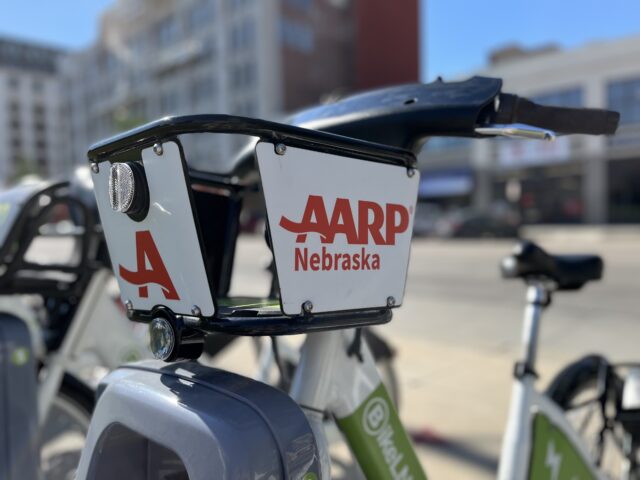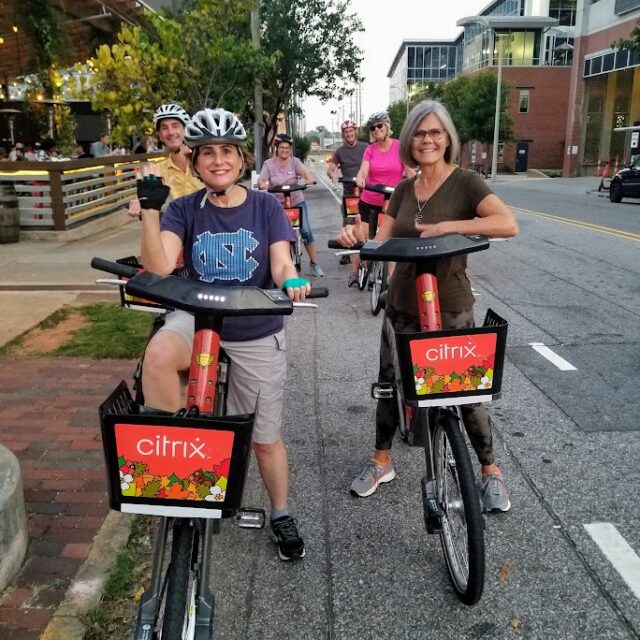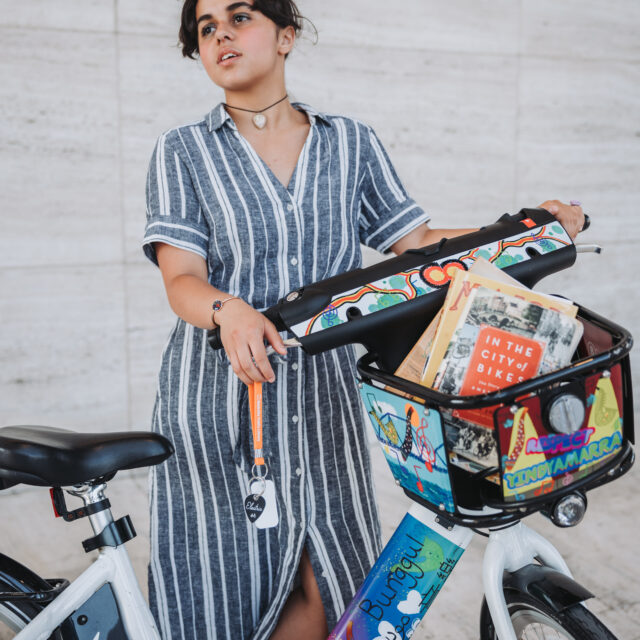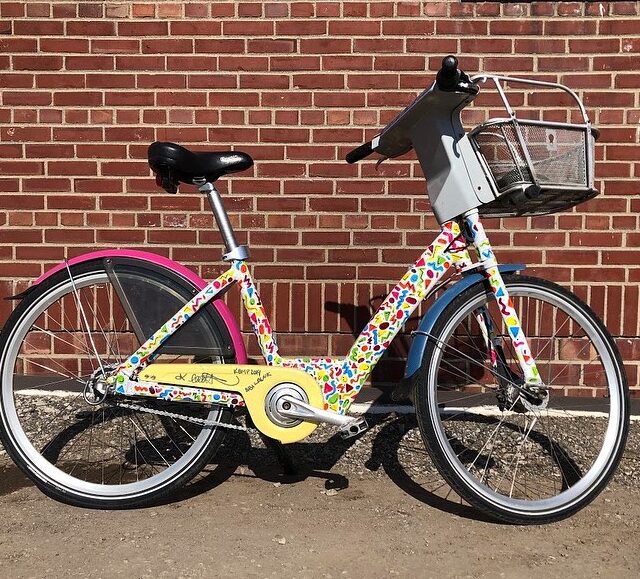Bike Share Can Help People Age In Place
by Kiran Herbert, Communications Manager
August 2, 2022
In Lincoln, Nebraska, Roam Share recently received a grant from AARP to help educate and engage older adults around its BikeLNK system.

Unless you’re nearing 50, you’re likely not paying much attention to the work of AARP. An interest group for older adults, the organization was founded in 1958 and today boasts more than 38 million members — its magazine is the largest-circulation publication in the United States. The nonprofit’s mission is dedicated to empowering Americans 50-plus to choose how they live as they age. It shouldn’t come as a surprise then that, through its Community Challenge grants, AARP has embraced bicycling programs in general and bike share specifically.
Launched in 2017, AARP Community Challenge was envisioned as a way to support quick-action programs and help make places more livable in the long term. The grants are incredibly popular and this year, AARP was able to award $3.4 million to some 260 organizations nationwide. One of those was BikeLNK, the bike share system in Lincoln, Nebraska, which alongside Omaha and Valentine’s systems, is operated by the nonprofit Roam Share.
“We’re working to make sure cities, towns, and rural areas are great places to live for everyone and transportation is a big part of that,” says Todd Stubbendieck, the state director of AARP Nebraska. For BikeLNK, which is a partnership between the City of Lincoln and Heartland Bike Share, applying was a no-brainer. As with bike share systems across the country, older adults are an underrepresented demographic amongst BikeLNK riders.
“One of the barriers we’ve seen, particularly around older adults, is that owning, operating, and maintaining a bike can be difficult,” says Logan Spackman, the city manager for BikeLNK. “Bike share can solve that, especially when it has pedal-assist. We recognized that there was an opportunity there.”
As part of the $6,200 grant, BikeLNK will hold a series of educational events in Lincoln geared towards educating the larger Lincoln community about how to access and use bike share. Currently, students make up a large portion of the system’s riders and the events will cater to older adults by tailoring content, as well as choosing times and locations that better suit that demographic. Attendees will receive discounts on BikeLNK’s annual memberships, taking it from $100 a year for unlimited hour-long rides to $70. The events begin later this summer and will include Spanish translations of any related materials.
BikeLNK will also use a portion of the funding to launch a bike share ambassador program in mid-August, where 10 individuals will learn about bike share and then help to educate others in their circle (the program is open to everyone but priority will be given to those aged 50-plus). All ambassadors will receive an annual BikeLNK membership, participating in group rides and providing feedback around engagement practices and the system in general.
“It’s really our job as an operator to listen to community members and hear from them about how they experience bike share and what they need from our program,” says Spackman. “They’re gonna be some of our greatest partners in sharing what a valuable service bike share can be in Lincoln and in other cities too. Our hope is that we’re creating an engaged network of individuals that can go back to those communities and share what they’ve learned.”
Spackman has been excited to see that many of the applications for the ambassador program thus far have been from people who have never used bike share before. Stubbendieck and AARP were also particularly excited by the prospect of an ambassador program, as it will increase the visibility of older adults bicycling and help encourage peer-to-peer conversations around an active lifestyle.
Importantly, a little under a quarter of BikeLNK’s 130-bike fleet is electric-assist, which lowers the threshold for people to get on a bike. Already, the e-bikes in Lincoln see six times as many trips as the classic bikes. BikeLNK’s e-bikes also don’t cost any more to use than the classic bikes — a decision made by the City of Lincoln — showcasing that when e-bikes are made available, people use them.
When BikeLNK first introduced the e-bikes in 2020, it received funding from the state chapter of AARP Nebraska to purchase an e-bike and mobile docking station to take to communities and demonstrate how to use bike share. That same docking station will be used at the upcoming educational events, allowing BikeLNK to host at a wide variety of non-traditional locations.
“We love the e-bikes,” says Stubendieck. “They’ve really grown in popularity and are a great way for people who are older to get started, or started again, bicycling.”
For BikeLNK, getting a diversity of Lincoln residents using the system is at the heart of this grant and many of the system’s other initiatives. Like an increasing number of systems, BikeLNK maintains a membership pass program with the local public library, offers discounts to students and military members, and even has a prescription program dubbed Rx-a-BikeLNK, where those with poor health outcomes can receive a free bike share membership and helmet.
“We already have some great ways we’re connected to our communities and we see this grant as an extension of that,” says Spackman. “As bike share becomes more ubiquitous in cities across the country — at last count there were over 200 cities with bike share — we realize that if you haven’t used it before there can be certain stigmas about who bike share is for and who can use it. This work is meant to share that bike share is really for everyone.”
For those that may have imagined AARP only dealt with Social Security and Medicare, BikeLNK’s grant is a reminder that bike share has an important role to play when it comes to helping people age in place at stay in the lowest level of care as long as possible. For other bike share systems that may want to apply for a Community Grant in the future, Stubbendieck says the key is to think through how you’re going to engage an older population.
“Biking can really boost mental health, strengthen the immune system, and slow the aging process,” says Stubbendieck. “So getting people into biking — or oftentimes when they’re older, back into biking — is an important part of healthy living, slowing the aging process, and allowing people to age in place and be in their homes as long as possible.”
The Better Bike Share Partnership is funded by The JPB Foundation as a collaboration between the City of Philadelphia, the National Association of City Transportation Officials (NACTO) and the PeopleForBikes Foundation to build equitable and replicable bike share systems. Follow us on Facebook, Twitter and Instagram or sign up for our weekly newsletter. Got a question or a story idea? Email kiran@peopleforbikes.org.



